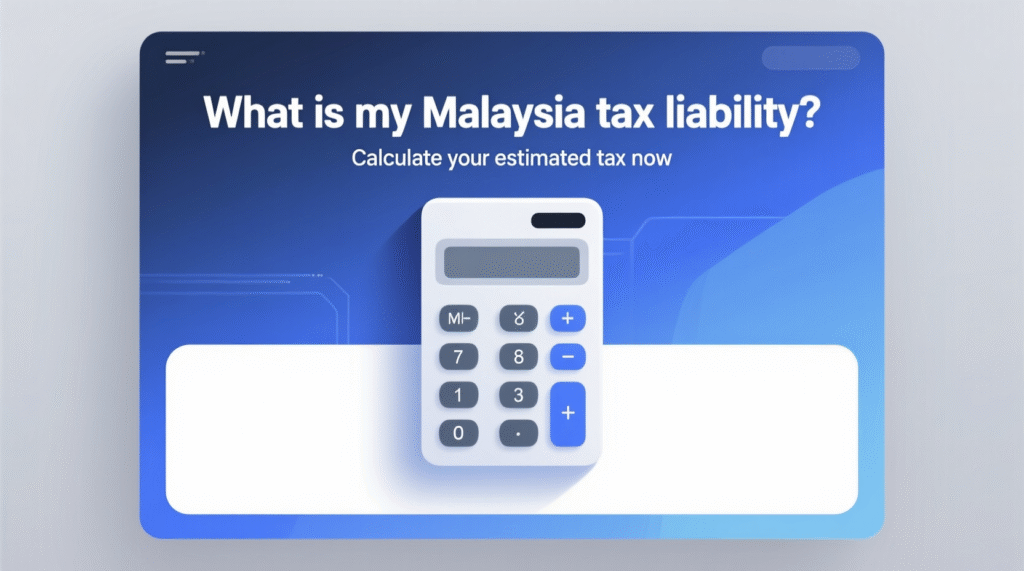
For most people, figuring out their Malaysia tax liability can be confusing. This guide is for Malaysian residents and non-residents who want to understand how their income tax is calculated, what they can claim, and how to stay on the right side of the law. We’ll walk through the exact steps to determine your tax payable, from your residency status to the final tax rebates.
How to Calculate Your Personal Tax Liability in Malaysia
Calculating your Malaysia income tax liability boils down to a simple formula:
Chargeable Income = Gross Annual Income – Tax Exemptions – Tax Reliefs
Once you have your chargeable income, you apply the progressive tax rates to find the tax payable.
Step 1: Establish Your Tax Residency Status
Your residency status is the first and most critical factor. It determines which tax rates and reliefs apply to you.
- Resident: You are a tax resident if you are present in Malaysia for 182 days or more in a given calendar year. As a resident, you benefit from Malaysia’s progressive tax rates and can claim various tax reliefs.
- Non-Resident: If you are in Malaysia for less than 182 days, you are a non-resident. Non-residents are typically taxed at a flat rate on income earned in Malaysia and are not eligible for personal tax reliefs.
Step 2: Determine Your Chargeable Income
This is the amount your tax will be calculated on. It’s not your gross salary, but a smaller, reduced amount after deductions.
- Gross Annual Income: This includes all your taxable income for the year, such as salary, bonuses, commissions, rental income, and other profits.
- Tax Exemptions & Reliefs: This is where you can significantly reduce your tax burden. The Lembaga Hasil Dalam Negeri (LHDN) provides numerous reliefs for expenses you’ve incurred.
Here are some of the most common tax reliefs you can claim as a resident:
- Self and Dependents: A standard relief of RM9,000 for yourself.
- EPF & Life Insurance: A combined relief of up to RM7,000 for mandatory EPF contributions and life insurance premiums.
- Lifestyle: A relief of up to RM2,500 for expenses like books, personal computers, smartphones, and gym memberships.
- Medical Expenses: Claims can be made for medical expenses for serious diseases, fertility treatment, and even for your parents.
Step 3: Apply Malaysia’s Progressive Tax Rates
Malaysia uses a progressive tax system, which means the more you earn, the higher your tax rate. Your chargeable income will fall into specific tax brackets, each with a different tax rate.
Sample Malaysia Tax Rate (YA 2025)
| Chargeable Income (RM) | Calculation | Rate (%) | Tax (RM) |
| 0 – 5,000 | On the first 5,000 | 0% | 0 |
| 20,001 – 35,000 | On the first 20,000 | 3% | 150 |
| 35,001 – 50,000 | On the first 35,000 | 6% | 600 |
| 50,001 – 70,000 | On the first 50,000 | 11% | 1,500 |
| 70,001 – 100,000 | On the first 70,000 | 19% | 3,700 |
Real-Life Examples: How do I calculate my tax?
Example 1: Salaried Employee
- Gross Annual Salary: RM60,000
- EPF Contribution: RM6,600
- Lifestyle Relief: RM2,500
- Self Relief: RM9,000
- Calculate Total Reliefs: RM6,600 (EPF) + RM2,500 (Lifestyle) + RM9,000 (Self) = RM18,100
- Calculate Chargeable Income: RM60,000 (Gross) – RM18,100 (Reliefs) = RM41,900
- Apply Tax Rates:
- First RM35,000 is taxed at RM600 (from the table above).
- The remaining RM6,900 (RM41,900 – RM35,000) is taxed at the 6% rate.
- Tax on excess: RM6,900 * 0.06 = RM414
- Total Tax Payable: RM600 + RM414 = RM1,014
FAQ Section: Common Questions About Malaysia Tax
1. How do I know if I need to pay income tax in Malaysia?
You need to pay income tax if your annual income (after EPF deductions) exceeds RM34,000. This is roughly equivalent to a monthly salary of RM2,833. Even if your tax liability is zero after reliefs, you must still file a tax return if you meet this threshold.
2. What is the difference between tax reliefs and tax rebates?
Tax reliefs reduce your chargeable income, lowering the amount that gets taxed. Tax rebates, on the other hand, are a direct reduction of the tax amount you owe. A common rebate is for individuals with a chargeable income of RM35,000 or less, which is RM400.
3. What is PCB and how does it relate to my tax?
PCB stands for Potongan Cukai Bulanan, or Monthly Tax Deduction (MTD). It’s a mandatory system where employers deduct a portion of your monthly salary and pay it to the LHDN on your behalf. This helps you avoid a large lump-sum tax payment at the end of the year.
4. How can I reduce my tax liability?
The best way is to maximize your tax reliefs. Be sure to keep receipts for all eligible expenses, such as medical checkups, books, and children’s education fees, so you can claim them when filing your tax return.
5. What happens if I fail to file my taxes?
Failing to file your income tax return by the deadline can lead to penalties, including fines and, in some cases, imprisonment. It’s best to use the LHDN’s e-Filing portal to submit your tax return on time to avoid any issues.
6. Is foreign-sourced income taxable in Malaysia?
Generally, foreign-sourced income brought into Malaysia by residents is taxed. However, there’s a tax exemption until 31 December 2026, on foreign-sourced income received by residents, with some exceptions for partnership income. You should always check the latest LHDN guidelines.
Willium is the creator of IncomeTaxCalculatorMalaysia.com, a trusted resource for accurate and easy-to-use tax calculation tools. With a deep understanding of Malaysia’s tax system, he helps individuals and businesses estimate their income tax with confidence. Willium is dedicated to simplifying financial decisions by offering clear, reliable tools and expert guidance, empowering users to stay informed and save time.
